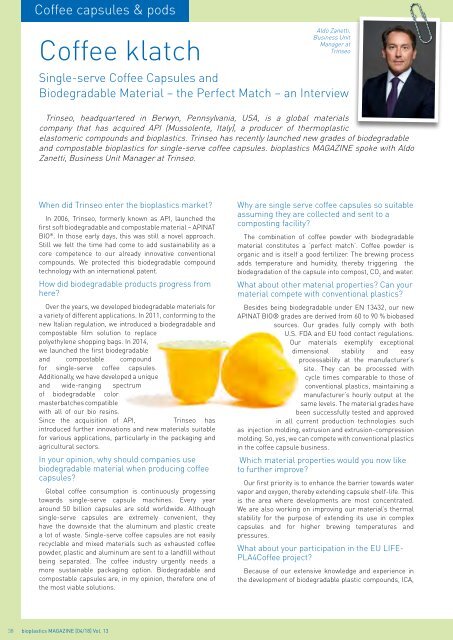Issue 04/2018
bioplasticsMAGAZINE_1804
bioplasticsMAGAZINE_1804
You also want an ePaper? Increase the reach of your titles
YUMPU automatically turns print PDFs into web optimized ePapers that Google loves.
Coffee capsules & pods<br />
Coffee klatch<br />
Aldo Zanetti,<br />
Business Unit<br />
Manager at<br />
Trinseo<br />
Single-serve Coffee Capsules and<br />
Biodegradable Material – the Perfect Match – an Interview<br />
Trinseo, headquartered in Berwyn, Pennsylvania, USA, is a global materials<br />
company that has acquired API (Mussolente, Italy), a producer of thermoplastic<br />
elastomeric compounds and bioplastics. Trinseo has recently launched new grades of biodegradable<br />
and compostable bioplastics for single-serve coffee capsules. bioplastics MAGAZINE spoke with Aldo<br />
Zanetti, Business Unit Manager at Trinseo.<br />
When did Trinseo enter the bioplastics market?<br />
In 2006, Trinseo, formerly known as API, launched the<br />
first soft biodegradable and compostable material – APINAT<br />
BIO ® . In those early days, this was still a novel approach.<br />
Still we felt the time had come to add sustainability as a<br />
core competence to our already innovative conventional<br />
compounds. We protected this biodegradable compound<br />
technology with an international patent.<br />
How did biodegradable products progress from<br />
here?<br />
Over the years, we developed biodegradable materials for<br />
a variety of different applications. In 2011, conforming to the<br />
new Italian regulation, we introduced a biodegradable and<br />
compostable film solution to replace<br />
polyethylene shopping bags. In 2014,<br />
we launched the first biodegradable<br />
and compostable compound<br />
for single-serve coffee capsules.<br />
Additionally, we have developed a unique<br />
and wide-ranging spectrum<br />
of biodegradable color<br />
masterbatches compatible<br />
with all of our bio resins.<br />
Since the acquisition of API, Trinseo has<br />
introduced further innovations and new materials suitable<br />
for various applications, particularly in the packaging and<br />
agricultural sectors.<br />
In your opinion, why should companies use<br />
biodegradable material when producing coffee<br />
capsules?<br />
Global coffee consumption is continuously progessing<br />
towards single-serve capsule machines. Every year<br />
around 50 billion capsules are sold worldwide. Although<br />
single-serve capsules are extremely convenient, they<br />
have the downside that the aluminum and plastic create<br />
a lot of waste. Single-serve coffee capsules are not easily<br />
recyclable and mixed materials such as exhausted coffee<br />
powder, plastic and aluminum are sent to a landfill without<br />
being separated. The coffee industry urgently needs a<br />
more sustainable packaging option. Biodegradable and<br />
compostable capsules are, in my opinion, therefore one of<br />
the most viable solutions.<br />
Why are single serve coffee capsules so suitable<br />
assuming they are collected and sent to a<br />
composting facility?<br />
The combination of coffee powder with biodegradable<br />
material constitutes a ‘perfect match’. Coffee powder is<br />
organic and is itself a good fertilizer. The brewing process<br />
adds temperature and humidity, thereby triggering the<br />
biodegradation of the capsule into compost, CO 2<br />
and water.<br />
What about other material properties? Can your<br />
material compete with conventional plastics?<br />
Besides being biodegradable under EN 13432, our new<br />
APINAT BIO® grades are derived from 60 to 90 % biobased<br />
sources. Our grades fully comply with both<br />
U.S. FDA and EU food contact regulations.<br />
Our materials exemplify exceptional<br />
dimensional stability and easy<br />
processability at the manufacturer’s<br />
site. They can be processed with<br />
cycle times comparable to those of<br />
conventional plastics, maintaining a<br />
manufacturer’s hourly output at the<br />
same levels. The material grades have<br />
been successfully tested and approved<br />
in all current production technologies such<br />
as injection molding, extrusion and extrusion-compression<br />
molding. So, yes, we can compete with conventional plastics<br />
in the coffee capsule business.<br />
Which material properties would you now like<br />
to further improve?<br />
Our first priority is to enhance the barrier towards water<br />
vapor and oxygen, thereby extending capsule shelf-life. This<br />
is the area where developments are most concentrated.<br />
We are also working on improving our material’s thermal<br />
stability for the purpose of extending its use in complex<br />
capsules and for higher brewing temperatures and<br />
pressures.<br />
What about your participation in the EU LIFE-<br />
PLA4Coffee project?<br />
Because of our extensive knowledge and experience in<br />
the development of biodegradable plastic compounds, ICA,<br />
38 bioplastics MAGAZINE [<strong>04</strong>/18] Vol. 13


















